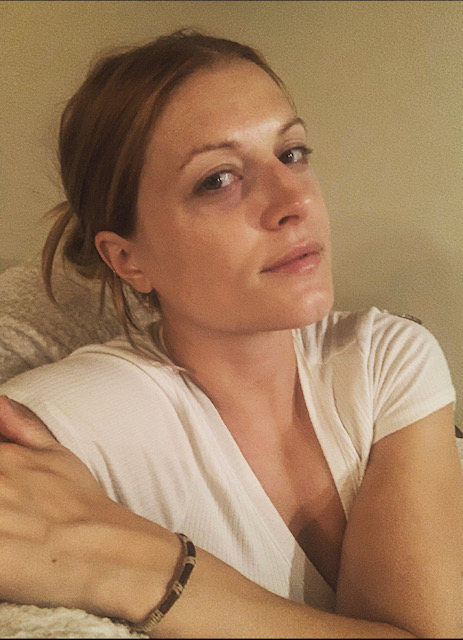With the start of another new year, I have been reminiscing on 2022 as well as pondering any changes I want to make for the next 365 days. What I typically land on each year is aiming to be more mindful; being present and letting go of control, not worrying so much, and slowing down in general. This seems to be an ongoing battle for me.
While thinking about my aims for 2023, part of what I came to realize is that sometimes the reason I struggle with these things is because I pull so much emotion into every aspect of my life that letting go and being present can feel challenging when I want to feel everything so deeply. Certainly, expressing emotions is an excellent tool we need and crave as humans, but sometimes the level in which we emote or feel can add so much stress to our lives and can cause a lot of unnecessary fear, worry and stress, drama, anger, distractions, and rumination.
All of this reminded me of the concept of radical acceptance.
Imagine yourself holding onto a microphone and someone asks you how you would let go of it. Most people would say they would simply drop it or give the mic to someone else. No one can really give you several steps or directions on how to let go of the mic. Plus, you already know intuitively what to do.
Now, if the microphone was a snake, would you ask or contemplate how to let it go? I bet in that situation you would not ask; you would drop the snake immediately because you have all the information you need at that moment.
When we can let go of things without too much contemplation or emotion, we allow ourselves more room to enjoy life and be present; as soon as you see what it is you want to let go of, you can simply stop clinging to it.
I heard the above scenario while perusing TikTok (The Minimalists episode 372), and I compared it to the idea of radical acceptance. In a nutshell, radical acceptance is the idea that we can accept situations that are outside of our control without judgement, which decreases the stress, worry, fear, anger that is caused by the situation itself. The suffering we put ourselves through is caused by the attachment we have to the pain rather than to the situation itself. We need to detach to overcome. This does not imply that we avoid our emotions, we just simply do not need to let the pain cause additional worry, fear, stress, anger, etc. It’s about being mindful of our emotions so we do not go down the rabbit hole of feeling worse than we need to. We accept the situation, objectively, for what it is even if we do not agree with it.
Radical acceptance comes in handy during times where we cannot fix or change situations. Sure, it may feel yucky, unbearable, unfair, or unkind, but we prolong our suffering if we cannot accept something for what it is and try to add more emotionally driven responses to it than necessary. Yes, we will feel remorse, disappointment, grief and sorrow, or anger as they are normal reactions when something happens to us that we did not anticipate or did not like. However, it’s choosing not to let the emotions take over and learning to accept things for what they are. It is when we practice radical acceptance that we can be more mindful and enjoy all the great things that are yet to come. Adding emotions is where we begin to torture ourselves because we ruminate on situations outside of our control. We get distracted, we dwell, we gossip, we avoid, and we get resentful. Think of radical acceptance as a way to be nicer to ourselves. It is not about forgiveness towards the person who caused the pain in the first place because the focus is on you and loving yourself enough to ease up.
It is not easy to do, but ultimately to practice radical acceptance we have to focus more on our Logical Mind as that is where we are able to remain calm and objective. When we remind ourselves of what we can control, we can better detach from the feelings associated with the situation. To focus specifically on the reality is to be in what is called Wise Mind which is a balance between our emotions and our logic. This helps us to focus on moving past the situation and pushing onward. The goal is not to avoid our emotions, but to move through the emotion and have an “it-is-what-it-is” mindset. It is then that we can calmy and objectively accept things as they are.
This new way of thinking is easier when we are aware of situations that easily trigger us so we can prepare when unforeseen situations arise; this step is very important. I personally have to constantly remind myself that I can’t change it, that it is my reality, and that it’s out of my control. I try to focus on being mindful of what I can control, consider why this is affecting me so much by allowing myself to feel the emotions that come up, but then shift my focus on the gratitude I have for life even amongst the pain I am feeling. I remind myself that this too shall pass and someday it will not be as tough. The goal is committing to pushing past the pain and objectively understanding the need to let go. It is extra helpful to think of being on the other side of the hurdle and how much easier life gets when we allow ourselves to move forward versus sit in the yuckiness the situation and our emotional responses cause. We do not think about the what if’s, as those do not apply. Remind yourself of your resilience and that you can get through this, because you can, and you will, and you have before. You can have your emotions and also still choose happiness.
Lastly, it’s important to differentiate between appropriately using the approach of radical acceptance versus using it as a reason to stay in an unhealthy situation. It works for situations where unexpected change occurs; you go through something traumatic, you come to a dead-end where nothing seems to be working, you are transitioning out of a job or relationship, or maybe you lose someone close to you. Those can all happen to us where we cannot control the situation or outcome. Radical acceptance doesn’t work when we choose to stay in an unhealthy situation (work, relationship, friendship, family dynamic), allow ourselves to be treated badly, lack motivation and drive, or when we live in fear and avoidance. These situations can be changed and improved, so it’s important that we acknowledge the difference.
The goal is for life to feel better, lighter, simpler, and be filled with joy. It takes time to make radical acceptance a natural habit, but the benefits of moving forward and letting go are worth it.
On this sacred path of Radical Acceptance, rather than striving for perfection, we discover how to love ourselves into wholeness.
-keep shining
Find me:
Facebook, Twitter, Instagram, Pinterest





Recent Comments